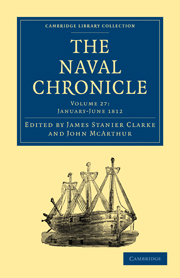 The Naval Chronicle
The Naval Chronicle Book contents
- Frontmatter
- PLATES IN VOLUME XXVII From Original Designs
- PREFACE
- BIOGRAPHICAL MEMOIR OF ARTHUR PHILLIP, ESQ. VICE-ADMIRAL OF THE RED SQUADRON
- BIOGRAPHICAL MEMOIR OF THE LATE NICHOLAS HADDOCK, ESQ, ADMIRAL OF THE BLUE SQUADRON
- BIOGRAPHICAL MEMOIR OF THE LATE SIR JAMES WISHART, KNT. ADMIRAL OF THE WHITE SQUADRON
- BIOGRAPHICAL MEMOIR OF THE LATE SIR CHARLES COTTON, BART, ADMIRAL OF THE WHITE SQUADRON
- INDEX
BIOGRAPHICAL MEMOIR OF THE LATE SIR CHARLES COTTON, BART, ADMIRAL OF THE WHITE SQUADRON
Published online by Cambridge University Press: 10 January 2011
- Frontmatter
- PLATES IN VOLUME XXVII From Original Designs
- PREFACE
- BIOGRAPHICAL MEMOIR OF ARTHUR PHILLIP, ESQ. VICE-ADMIRAL OF THE RED SQUADRON
- BIOGRAPHICAL MEMOIR OF THE LATE NICHOLAS HADDOCK, ESQ, ADMIRAL OF THE BLUE SQUADRON
- BIOGRAPHICAL MEMOIR OF THE LATE SIR JAMES WISHART, KNT. ADMIRAL OF THE WHITE SQUADRON
- BIOGRAPHICAL MEMOIR OF THE LATE SIR CHARLES COTTON, BART, ADMIRAL OF THE WHITE SQUADRON
- INDEX
Summary
“Dignum laude virum Musa vetat mori.”
“The Muse forbids a praise-worthy man to die.”
Hor. B. IV. Od. 8Sir charles cotton, Bart. Admiral of the White Squadron, and late Commander-in-Chief of the Channel Fleet, was the third son of Sir John Hynde Cotton, Bart. of Madingly, and Landwade, in Cambridgeshire, by Anne, daughter of Humphrey Parsons, Esq. He was born in the month of June. 1753, and was educated at Westminster School, under the late Doctors Markham and Smith. At an early age, he made considerable progress in learning; and, previously to his leaving Westminster, in the year 1770, he had attained the highest form.
In this gentleman, as in many other distinguished officers, whose services have been recorded in the Naval Chronicle, “the ruling passion,” or propensity, displayed itself even in boyhood. While at school, that inclination which afterwards induced him to embrace the nautical profession, was strongly apparent. In every frolic and excursion upon the Thames, young Cotton was foremost; and, by that collectedness and courage which, throughout life, never forsook him, he frequently extricated himself from situations of danger, in which others would have been lost. This strong bias, however, did not lead him to oppose his father's wishes; in conformity with which, he was entered, as had been originally intended, a member of Lincoln's Inn.
- Type
- Chapter
- Information
- The Naval ChronicleContaining a General and Biographical History of the Royal Navy of the United Kingdom with a Variety of Original Papers on Nautical Subjects, pp. 353 - 515Publisher: Cambridge University PressPrint publication year: 2010First published in: 1812


